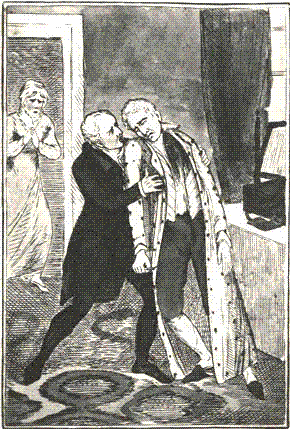Robert Stewart, Viscount Castlereagh
Robert Stewart, Viscount Castlereagh (18 June 1769 – 12 August 1822) was an Anglo-Irish statesman and politician, best known for his role as Foreign Secretary in the United Kingdom from 1812 to 1822. He played a significant role in the defeat of Napoleon Bonaparte and was a key figure in the Congress of Vienna.
Early Life and Education[edit | edit source]
Robert Stewart was born in Dublin, Ireland, the son of Robert Stewart, 1st Marquess of Londonderry and his first wife, Lady Sarah Frances Seymour. He was educated at Armagh and later attended St John's College, Cambridge.
Political Career[edit | edit source]
Castlereagh entered the Irish House of Commons in 1790 as a member for Down. He was a supporter of the Act of Union 1800, which merged the Kingdom of Ireland and the Kingdom of Great Britain into the United Kingdom of Great Britain and Ireland.
Chief Secretary for Ireland[edit | edit source]
In 1798, Castlereagh was appointed Chief Secretary for Ireland. During his tenure, he was involved in the suppression of the Irish Rebellion of 1798 and played a crucial role in the passage of the Act of Union.
Secretary of State for War and the Colonies[edit | edit source]
In 1805, Castlereagh was appointed Secretary of State for War and the Colonies. He was responsible for the British war effort during the Napoleonic Wars and was instrumental in the planning of the Peninsular War.
Foreign Secretary[edit | edit source]
In 1812, Castlereagh became Foreign Secretary, a position he held until his death in 1822. He was a principal architect of the Coalition that defeated Napoleon and was a leading figure at the Congress of Vienna, where he worked to establish a balance of power in Europe.
Personal Life[edit | edit source]
Castlereagh married Lady Amelia Hobart in 1794. The couple had no children. He suffered from severe depression and committed suicide in 1822.
Legacy[edit | edit source]
Castlereagh's legacy is complex; he is remembered for his diplomatic skills and his role in shaping post-Napoleonic Europe, but also for his repressive measures in Ireland and his controversial policies.
Related Pages[edit | edit source]
- Napoleonic Wars
- Congress of Vienna
- Act of Union 1800
- Irish Rebellion of 1798
- Peninsular War
- United Kingdom of Great Britain and Ireland
References[edit | edit source]
External Links[edit | edit source]
Search WikiMD
Ad.Tired of being Overweight? Try W8MD's physician weight loss program.
Semaglutide (Ozempic / Wegovy and Tirzepatide (Mounjaro / Zepbound) available.
Advertise on WikiMD
|
WikiMD's Wellness Encyclopedia |
| Let Food Be Thy Medicine Medicine Thy Food - Hippocrates |
Translate this page: - East Asian
中文,
日本,
한국어,
South Asian
हिन्दी,
தமிழ்,
తెలుగు,
Urdu,
ಕನ್ನಡ,
Southeast Asian
Indonesian,
Vietnamese,
Thai,
မြန်မာဘာသာ,
বাংলা
European
español,
Deutsch,
français,
Greek,
português do Brasil,
polski,
română,
русский,
Nederlands,
norsk,
svenska,
suomi,
Italian
Middle Eastern & African
عربى,
Turkish,
Persian,
Hebrew,
Afrikaans,
isiZulu,
Kiswahili,
Other
Bulgarian,
Hungarian,
Czech,
Swedish,
മലയാളം,
मराठी,
ਪੰਜਾਬੀ,
ગુજરાતી,
Portuguese,
Ukrainian
Medical Disclaimer: WikiMD is not a substitute for professional medical advice. The information on WikiMD is provided as an information resource only, may be incorrect, outdated or misleading, and is not to be used or relied on for any diagnostic or treatment purposes. Please consult your health care provider before making any healthcare decisions or for guidance about a specific medical condition. WikiMD expressly disclaims responsibility, and shall have no liability, for any damages, loss, injury, or liability whatsoever suffered as a result of your reliance on the information contained in this site. By visiting this site you agree to the foregoing terms and conditions, which may from time to time be changed or supplemented by WikiMD. If you do not agree to the foregoing terms and conditions, you should not enter or use this site. See full disclaimer.
Credits:Most images are courtesy of Wikimedia commons, and templates Wikipedia, licensed under CC BY SA or similar.
- 1769 births
- 1822 deaths
- Alumni of St John's College, Cambridge
- British Secretaries of State
- Chief Secretaries for Ireland
- Foreign Secretaries of the United Kingdom
- Members of the Privy Council of the United Kingdom
- People from Dublin (city)
- Suicides in the United Kingdom
- Viscounts in the Peerage of Ireland
- Members of the Parliament of the United Kingdom for County Down constituencies (1801–1922)
- Members of the Parliament of Ireland (pre-1801)
- All stub articles
- Politician stubs
Contributors: Prab R. Tumpati, MD






